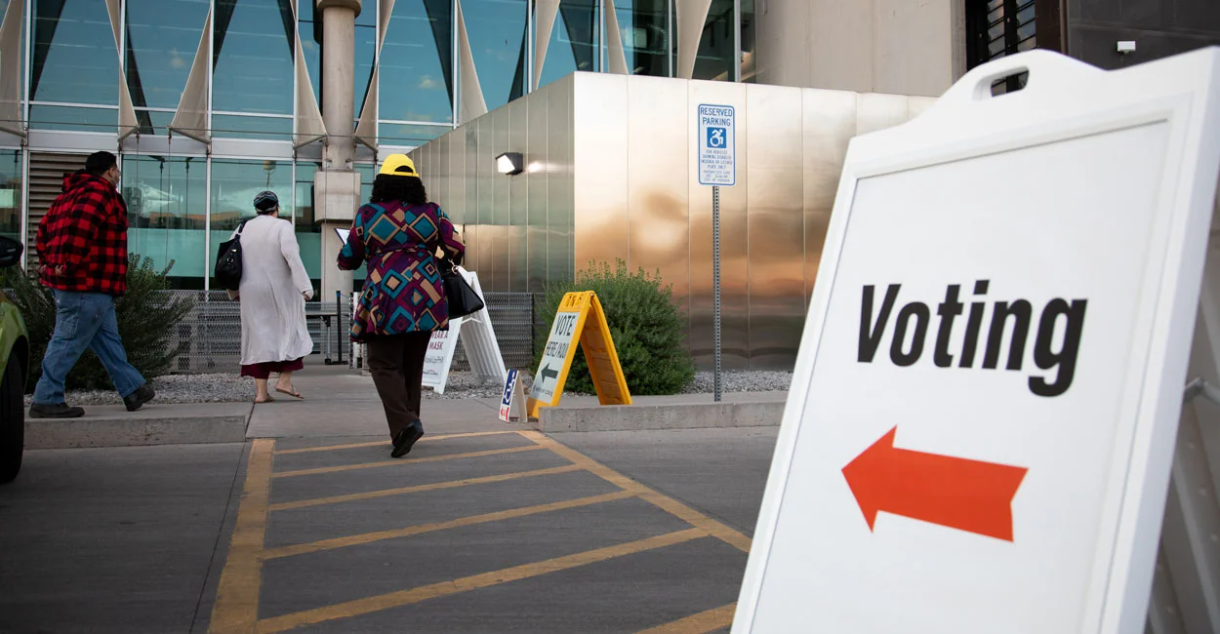
Voters enter Burton Barr Central Library in Phoenix to cast their ballots Nov. 3, 2020. (Photo: Courtney Pedroza/Stringer/Getty Images)
The Good, the Bad, and the Ugly Election-Related Referenda on State Ballots
From Hans von Spakovsky
Next Tuesday, voters in many states will weigh in on several election integrity-related referenda. Some are good changes that would improve election integrity; others are bad and would make elections in those states less secure; and one is downright ugly—written in a way intended to fool voters.
The good ballot measures include:
- Arizona Proposition 309, which would implement what an overwhelming majority of voters of all races and political views support—a voter ID requirement for both in-person and absentee balloting, including a free ID for anyone who requests one. The ID requirement for absentee ballots can be satisfied with a signature, a birth date, and the serial number of the voter’s government-issued ID card or last four digits of the voter’s Social Security number.
- Nebraska Initiative 432, which would amend the state’s constitution to require that voters show a photo ID to vote and authorize the state Legislature to implement the requirement, letting Nebraska join the majority of states with an ID requirement.
- Ohio Issue 2, which would amend the state’s constitution to specify that only citizens can vote in state and local elections and no local government can authorize aliens to vote in local elections. Louisiana has a similar Proposed Amendment 1 on its Dec. 10 general election ballot that would ban all aliens from registering or voting in the state (Nov. 8 is the date of the state’s congressional primary election under its “open” primary system).
- Massachusetts Question 4, which would repeal a state law prohibiting the Department of Motor Vehicles from asking individuals applying for driver’s licenses about their immigration status. This is important to election integrity because Massachusetts is one of the irresponsible states that implemented automatic voter registration in 2018, which adds anyone getting a driver’s license to the voter rolls, no questions asked. When combined with the DMV law, the Legislature is virtually guaranteeing that aliens will illegally register and vote.
The bad ballot measures include:
- Nevada Question 3, which would implement open primaries and ranked choice voting for legislative, congressional, and statewide elections, a sure method of disenfranchising voters and damaging political parties and the constitutional right of association. Open primaries take away the ability of parties and their members to decide who their nominees will be.
Ranked choice voting requires voters to preferentially rank all of the candidates in a race, from their first to their last choice. Former California Gov. Jerry Brown, a Democrat, vetoed a ranked choice voting bill in 2016, calling it an “overly complicated and confusing” form of voting that “deprives voters of genuinely informed choice.” Moreover, it often involves multiple rounds of ballot counting that result in the ballots of many voters being discarded if they failed to rank all of the candidates in a race.
- Connecticut Question 1, which would amend the state constitution to allow early voting. While some may find early voting convenient, such voters have no opportunity to change their vote if last-minute information comes out about a candidate prior to Election Day or there is a transformative debate such as just occurred in the Pennsylvania U.S. Senate race. In any event, the state’s voters already rejected early voting in 2014.
The ugly referendum is Michigan’s Proposal 2, which would make a series of damaging changes to the state’s constitution. Everyone agrees that individuals should be able to vote “without harassing conduct,” something already banned by federal law. The proposal then says that voters should verify their “identity with a photo ID,” since voters like that requirement.
But that language is there to con voters into not paying attention to the rest of the proposal, which actually guts the ID provision by saying anyone can vote if they simply sign a form claiming that they are who they say they are.
The proposal also makes it legal to give money to election officials and election offices to “fund elections,” opening the door for political donors to influence how elections are administered in order to benefit their favored candidates.
The Michigan proposal further creates permanent absentee ballot lists, guaranteeing that ballots will go to voters who are deceased or have moved out of state; authorizes unguarded, unmonitored, unsecured drop boxes; and says that only election officials can conduct audits, which would result in election officials auditing their own behavior—a clear conflict of interest.
That sure is a rule that corporate officials all over the country would love, to the dismay of their shareholders, and it should dismay the shareholders of Michigan elections: the voters of the state.
Voters who care about election integrity should pay close attention to these referenda so they know what they’re voting for.
Hans von Spakovsky / @HvonSpakovsky
Hans von Spakovsky is a senior legal fellow at The Heritage Foundation, a former commissioner on the Federal Election Commission, and former counsel to the assistant attorney general for civil rights at the U.S. Department of Justice. He is a member of the board of the Public Interest Legal Foundation.
From dailysignal.com